Meet some of the LGBTQ+ staff members who are Out@UCL
We have many LGBTQ+ staff members who are proud to be Out@UCL. Find out more about some of them here!
- Bob Mills
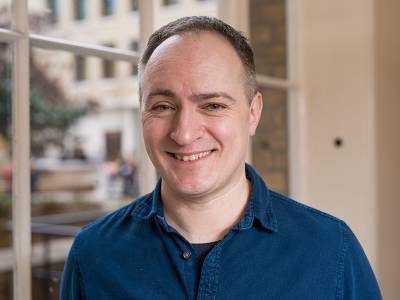
Who are you?
I’m a medievalist and vegetarian. I’m also a keen gardener.
I identify as a gay man and he/him are my preferred pronouns, but I don’t feel strongly invested in masculinity as a binary category. When I was in primary school I played with dolls, most of my friends were female and I remember sometimes being told by my male peers to get into the ‘girl’s line’ when we queued for lunch. While I wouldn’t want to claim trans identity as such, these early experiences were formative and have given me a strong sense of affiliation with anyone who finds themselves being misgendered or treated differently because they don’t conform to stereotypes.
What’s your role at UCL?
Professor of Medieval Studies in the History of Art Department at UCL. I also helped found and was the first Director (until September 2018) of UCL’s LGBTQ+ research network qUCL.
Could you share something about your coming-out process (whether to yourself or others)?
I had my first serious crush on a boy when I was 10 and I knew I was more attracted to males pretty much from that point on. At the time ‘queer’ was used almost exclusively as a term of abuse and I remember my primary school teacher once lamenting in class the fact that the word ‘gay’ didn’t mean what it used to!
It wasn’t until my second term of university in Manchester that I came out: I put in a call to the student-led counselling service Nightline, which took great courage as I had to use a payphone in my hall of residence. The counsellor I spoke to suggested that I might meet like-minded people if I showed up the next day at a preliminary training session for new Nightline volunteers. I went along and it was the best decision of my life. Some of the friends I made then are still friends now. And before long I was enjoying the benefits of Manchester’s burgeoning queer scene.
What challenges have you faced in being LGBTQ+? How did you meet these challenges?
I’ve experienced homophobia, of course, but less so now than in the 1990s. One challenge is sometimes simply dealing with invisibility. I occasionally travel with female friends and it’s assumed that we’re a straight couple. This has even happened when I’ve been out and about with my sister and her children. Simply being read as ‘straight’ is obviously preferable to violence or name-calling. But assumptions that heterosexuality is the default position or norm can itself sometimes feel oppressive.
What are some good things that being LGBTQ+ has brought you?
I guess I made a whole academic career out of it! My research focuses especially on representations of gender and sexuality in the Middle Ages and I’ve published books on medieval sodomy and on the queer British artist Derek Jarman. I’ve been the inaugural director of two LGBTQ research networks, Queer@King’s and qUCL, and working with other LGBTQ+ staff through UCL’s LGBTQ+ Advisory Group ‘LEAG’ has put me in touch with some wonderful colleagues who I wouldn’t otherwise have met. I’m also passionate about making queer histories accessible to a wider public through activities such as walks and exhibitions.
Not being LGBTQ+ wouldn’t necessarily prevent me from participating in some of these activities, but having a personal investment has certainly been a motivating factor. I don’t necessarily believe that the best historical scholarship is or should be ‘dispassionate’ or ‘disinterested’. Whether we choose to admit it or not, the way we represent the past will always be passionate and interested on some level, directed at transforming the world through what we know.
Does being LGBTQ+ affect your work life? If so, how?
Yes: my answer to the previous question says it all. I couldn’t really imagine doing the job I do now and not having some investment in issues of sexual and gender diversity.
What advice would you give someone in the UCL community thinking about coming out?
Coming out is an ongoing process. It doesn’t just happen once and there will always be areas of your life where you feel the need to ‘out’ yourself all over again (see my comments above about invisibility). But UCL plays host to some very supportive initiatives, including the Out@UCL staff network and Friends of Out@UCL. The regular Out@UCL networking lunches are a great way to meet colleagues from right across the university.
How can we make UCL even more welcoming for LGBTQ+ staff, students, and visitors?
The trans community has taken a bit of a battering in British media in recent months, so I’m pleased to see UCL supporting initiatives such as the Trans Studies, Trans Lives symposium in May 2019. Having Out@UCL members tell their diverse stories and making them visible on the UCL web pages also sends a strong message that our university values the sexual and gender diversity of its staff.
We shouldn’t forget our alumni either. In February 2019 I helped curate The Queer Tapestry display in UCL North Cloisters, which uncovers the experiences of UCL’s LGBTQ+ alumni. Some of the stories collated there are really inspiring and the response to the exhibition has been fantastic.
Why are LGBTQ+ role models important to you?
They give me a sense that I can be myself.
Who are your own LGBTQ+ role models (past or present)?
One particularly important role model for me, starting out as a medievalist, was the historian John Boswell. Boswell was a key figure in the emerging field of lesbian and gay studies, as it was known in the 1980s, and published an influential book on homosexuality and medieval Christianity. I first read this book as an undergraduate and while I don’t agree with all of his arguments, Boswell’s scholarship was hugely inspiring. Without the pioneering work of generations of previous scholars such as this my own research simply wouldn’t be possible.
Tell us something about yourself that we might find surprising.
I’m a karaoke queen. My signature number is ‘It’s a Sin’ by Pet Shop Boys.
- Johanna Novales
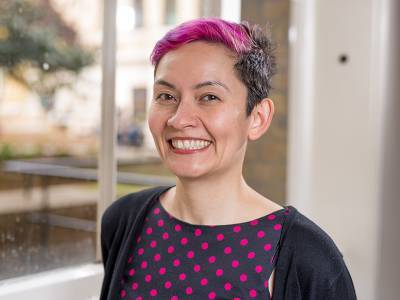
Who are you?
I live in between a lot of binaries! I’m a mixed-race, nonbinary (they/them pronouns, please), queer/bisexual ambivert. I’m from New York but have been living in the UK for over a decade.
What’s your role at UCL?
I’m currently on secondment as an Equality, Diversity and Inclusion Manager; our team sits directly in the Provost’s office. When I’m not on secondment, I work as Executive Assistant to the Dean of Engineering.
Could you share something about your coming-out process (whether to yourself or others)?
Coming out as nonbinary is an ongoing process – I feel like most people in my life are at an okay point with queerness (or if they’re not, they’re not telling me about it), but explaining how I opt out of the gender binary and why can be a little more difficult. I negotiate with myself a lot regarding pronouns and when I don’t have the energy to correct people and how I feel about it.
What challenges have you faced in being LGBTQ+? How did you meet these challenges?
As someone bisexual whose long-term relationships have often looked heterosexual from the outside, I deal with a lot of invisibility; similarly with being nonbinary and yet most comfortable with clothes that are deemed appropriate for the gender I get read as. It’s been a long road to accept myself and my gender presentation as not somehow disqualifying me as nonbinary! It took a lot of soul-searching, messing around with my wardrobe, and scouring the internet for images of, and thoughts from, a wide variety of nonbinary people to get me to that point.
What are some good things that being LGBTQ+ has brought you?
A very dear friend and I worked together on a project years ago exploring how we felt about not having a gender, and it was really comforting to explore this with someone so important to me who was also exploring it at the same time. At home, I helped found a group for queer Asians, and the energy all of us threw into carving out our place in the community was so inspiring; the group still exists today, which I am immensely proud of. In general, being queer has brought a lot of wonderful, thoughtful, passionate people into my life!
Does being LGBTQ+ affect your work life? If so, how?
I’m almost constantly misgendered, as someone nonbinary who is generally read as the gender I was assigned at birth, and I usually don’t feel safe correcting coworkers. This is changing a little – when I first came to UCL several years ago, no one on staff seemed to be talking about nonbinary identities. In the staff directory, there’s a free-text box to write in your own title, so I put in “Mx.”, only to realise that apparently no one had ever used that box before, as it promptly broke my display name in my email! Happily, now it’s fixed and others can choose this title as well. Sometimes people still call me and tell me in tones of great concern that there’s a typo in my directory listing in my title, though.
What advice would you give someone in the UCL community thinking about coming out?
Don’t feel pressured to come out if you’re not ready! There’s a lot of discourse around how everyone has to come out and be proud, and in an ideal world, sure. But in the world we live in, there are often serious implications for financial, physical, and emotional wellbeing. If you’re in a precarious situation and worried about any kind of violent or abusive response, make sure you’ve got some support lined up for yourself beforehand.
How can we make UCL even more welcoming for LGBTQ+ staff, students, and visitors?
Normalising the use of pronouns in email signatures and introductory use of pronouns, especially by people who are cis. Underscoring the inclusion of, and support of, minority groups within the LGBTQ+ spectrum – trans people, people of colour, people of faith.
Why are LGBTQ+ role models important to you?
They show what’s possible – that it’s possible to be radically, honestly yourself, and that even if there’s a cost to it, it can be worth it.
Who are your own LGBTQ+ role models (past or present)?
One of my best friends from high school was the first person I knew to come out as trans; his forthrightness and patience and courage as he navigated this still strikes me to this day. I’d also like to shout out the gender-neutral, queer- and trans-friendly Open Barbers, whose amazing staff have created such a lovely warm pocket of community among their clients (I also love that when you book a hair appointment you can specify your pronouns!).
Tell us something about yourself that we might find surprising.
I’m a devoted swing dancer! I never grew up dancing or doing sports really, but somehow today I’m even in a swing dance troupe! (I’m a switch – I both lead and follow – which is another way I bust through binaries…) I’m always up for queering up the scene, so aspiring dancers should get in touch!
- John Wells
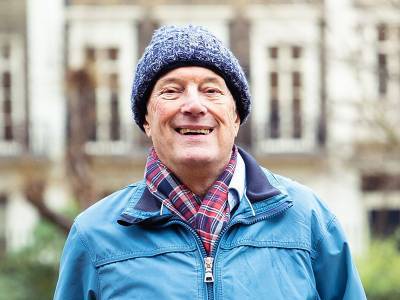
Who are you?
I’m an elderly gay white English man. I have been living with my partner for over fifty years. He is a black man, who was born in the Caribbean but has lived in England since his teens. Shortly after civil partnerships were introduced in the UK, we became civil partners.
What’s your role at UCL?
Emeritus Professor of Phonetics.
Could you share something about your coming-out process (whether to yourself or others)?
At age 19 I told my parents that I was homosexual. Fortunately, I come from a loving family, and the first thing my father, an Anglican clergyman, said in reply was, “You’re our son and we’ll always love you no matter what.” He spoke of hating the sin but loving the sinner. In practice my parents always welcomed any friend I brought home.
From age 21 onwards I did not attempt to conceal my sexuality from my close friends, though I never chose to advertise it openly to all.
What challenges have you faced in being LGBTQ+? How did you meet these challenges?
Until I was in my late twenties, gay sex of any kind was illegal, so technically my sexual behaviour at that time was criminal. Early in my career as a lecturer at UCL, I was approached by the Home Office to undertake research for them. I did not accept their invitation, because if I had accepted they would have been certain to give me a security vetting and discover my “criminal” behaviour, which could have meant that I would share the fate of Alan Turing.
Years later I was arrested on a charge of gross indecency. I pleaded not guilty. My Head of Department at UCL was supportive, making sure that I was legally represented in court. Then the prosecution witness failed to attend, so the case against me collapsed.
I have never encountered any homophobia from my UCL colleagues. UCL deserves its reputation as an LGBT-friendly employer.
What are some good things that being LGBTQ+ has brought you?
Inspiration and assistance for my PhD from an early boyfriend. Fifty-plus happy years of love and companionship from my partner. Furthermore, not having children means that I have had more time, money, and energy to devote to teaching, research, writing, broadcasting, and travel.
What advice would you give someone in the UCL community thinking about coming out?
Do it.
Tell us something about yourself that we might find surprising.
I once met and talked with Fidel Castro.
- Katy Le Lion
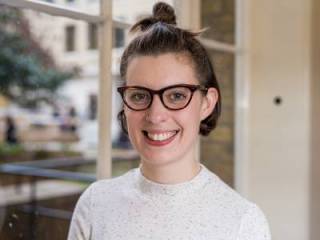
Who are you?
I float between identifying as a gay woman or lesbian depending on my mood and how many syllables I can muster that day!
What’s your role at UCL?
I am soon to start my new role as Department Manager in Chemical Engineering! I left for a year to try new things in other departments around UCL on what I call ‘a gap year’ and now I am excited to go back home J
Could you share something about your coming-out process (whether to yourself or others)?
The thing I found hardest to come to terms with wasn’t that my preferential interest was towards women, it was the fact I couldn’t feel the same towards men and I felt that perhaps if I did, even just a tiny bit, life in some way would be easier for me. Internalising this for a years in my early teens made it all the more difficult so it was a HUGE relief when I came out to my family and they had a very good but normal response! From that point on that particular concern had disappeared and I could then face the world as a gay/lesbian woman and deal with whatever it had in store for me.
What challenges have you faced in being LGBTQ+? How did you meet these challenges?
Although the challenges I face now crop up less often, they are the same challenges. Mostly people ask some rather ‘interesting’, but very common, questions such as (in reference to me and my wife) ‘do you both wear dresses and trousers then?’ and my personal favourite ‘do you call each other wife or is one of you husband?’. It doesn’t happen as often now which makes it less frustrating because it means that things are improving but when it does, the asker is met with a laugh and a jokey response correcting them so they understand the questions are silly. Because that is exactly what they are!
What are some good things that being LGBTQ+ has brought you?
Being LGBTQ+ has given me this sense of belonging to the most wonderfully vibrant and vivacious community I wouldn’t otherwise be part of!
Does being LGBTQ+ affect your work life? If so, how?
In UCL it has only ever affected me in a very positive way. The university not only allows you the mental space to be you, it also celebrates you and everything that comes with that!
What advice would you give someone in the UCL community thinking about coming out?
Only do and say what makes you feel comfortable, happy and safe. Everyone’s stories and experiences ae different so let you be you in your own time. You know yourself better than anyone!
How can we make UCL even more welcoming for LGBTQ+ staff, students, and visitors?
Visibility, not making assumptions about peoples sexual preference or identities and educating people on the correct use of gender pronouns.
Who are your own LGBTQ+ role models (past or present)?
This is a total cheese fest but my wife! She came out later in life in comparison to me, 6 months before we met in fact, and has been embracing and fighting the LGBTQ+ cause ever since! Historically, I was definitely a person who would rather melt into the background when it came to my sexuality and try to skip over talking about it in too much detail but my wife FLEW out of that closet with a passion for positive change like I have never seen before!
Tell us something about yourself that we might find surprising.
I have recently started making my own beauty products! I did this to save money and reduce plastic use but I quickly realised it is not a cheap hobby haha!. I also do an average to good impression of Heather Small singing ‘Search for the Hero’ :D
- Mike Witcombe
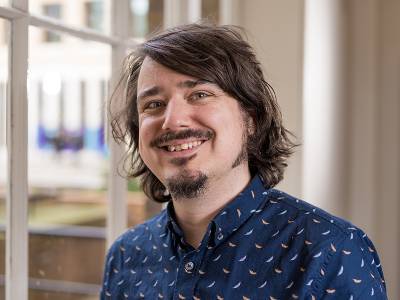
Who are you?
I’m Mike (he/him), and I identify as bisexual/queer. I’m a relatively new face at UCL, having previously worked at Queen Mary University. I’m Scottish by birth and a Londoner by inclination!
What’s your role at UCL?
I’m employed in Professional Services, where I manage one of UCL’s world-leading Centres for Doctoral Training. I help our academics train the next generation of data scientists by supporting a large cohort of PhD students. It’s a fun and varied job!
Could you share something about your coming-out process (whether to yourself or others)?
I came out when I was an undergraduate, partly because my university’s environment felt so inclusive and supportive. It’s fantastic to see that UCL has the same aspirations for its LGBTQ+ staff.
Does being LGBTQ+ affect your work life? If so, how?
When I started, the first thing I saw was a “Friend of Out@UCL” sticker on my shared office door! It’s great to be supported so visibly by my colleagues, and gave me the confidence to be more open about my identity in the office.
What advice would you give someone in the UCL community thinking about coming out?
If you decide to come out, you will find a lot of support, and many people willing to identify as allies. However, it’s a different experience for everyone, so I would never pressurise anyone into making a decision.
Tell us something about yourself that we might find surprising.
I’m an avid softball player! London has a surprisingly wide range of LGBTQ+ and LGBTQ+-friendly teams to play in, and the league I play in has a very forward-thinking attitude towards gender diversity.
- Nick Batley
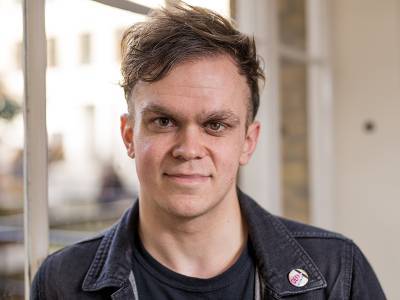
Who are you?
Hi, I’m Nick! I’m a bisexual cisgender man from the UK, and I use the pronouns he and him. :)
What’s your role at UCL?
I work in the Students’ Union for the Volunteering Service as a Student-Led Projects Administrator; essentially I help students with the community volunteering projects that they have set up themselves!
Could you share something about your coming-out process (whether to yourself or others)?
I think I came out to myself when I was 18/19, just after I visited my first gay bar with friends. I think that was when I finally accepted something that I’d been denying to myself for a long time. I came out to my family a few years later (when I was 22) at my aunt’s civil partnership, and I was relieved when they were welcoming and accepting. They even said they already knew!
What challenges have you faced in being LGBTQ+? How did you meet these challenges?
For me, it’s mainly the insults and derision I face when I am presenting in an openly queer manner (glitter, heels, the lot). It’s just so dispiriting, even in London which I hold in my head as an open place, to still experience that. Luckily, I’m usually able to brush it off or clap back at them!
What are some good things that being LGBTQ+ has brought you?
The community! I have found so many people from the queer community through living in London, or through my voluntary work as a sex and relationships educator, and they are just so open and welcoming, and into the same things I am! It certainly made the process of discovering myself and coming out to myself easier!
Does being LGBTQ+ affect your work life? If so, how?
I think the great thing is that it hasn’t. I’ve never been shy about my sexuality to my colleagues, and they’ve always been welcoming and understanding about it, which is such a relief. In my first week, my colleague (an LGBTQ+ ally) even took me to an Out@UCL gathering!
What advice would you give someone in the UCL community thinking about coming out?
I think in general, you will have a positive experience. UCL is by no means perfect, but I have always seen it as a welcoming environment with regards to the queer community, and that I feel has been led by the positive work of both the LGBT+ campaign at the Students’ Union, and the work of Out@UCL.
Why are LGBTQ+ role models important to you?
I think they are important for realising there are people like you, who have made it for themselves, and who are there to show other queer folk who are struggling that they too can survive and thrive.
Tell us something about yourself that we might find surprising.
In my spare time, I practice circus arts, specifically the aerial hoop/lyra. I’ve taken part in competitions, and am looking to perform!
- Sandra Springer
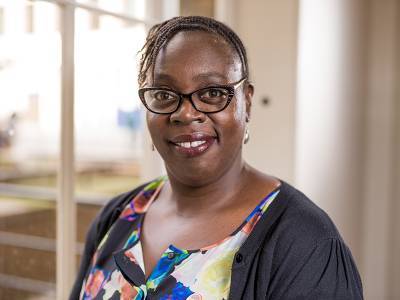
Who are you?
I’m a human being. My pronouns are she/her. My name is Sandra, Brown is my family name, Springer is one I acquired on the journey, I wanna change it all but what to? Sigh. I am ‘black’. I am a mother, a writer, a singer. I love to create things.
What’s your role at UCL?
I work in the DMS Watson building which houses the Science Library, I work on the Science Library Assistant Team. I work in a house of BOOKS! I love it.
Could you share something about your coming-out process (whether to yourself or others)?
My daughter is a Lesbian and came out at 14. When she was around 16/17, she point blank told me one day: ‘Mum, you’re a Dyke you know that? You’re a Lesbian.’ I was like: ‘Hell no!!’ But as it happens, she was right! My daughter played a very large role in my liberation. Without her, I’d still be in the closet – she dragged me out, kicking and screaming!! I’m very grateful for her wisdom, patience, and love.
What challenges have you faced in being LGBTQ+? How did you meet these challenges?
HOMOPHOBIA. Internalised, and external. Homophobia stopped me from being able to come out, fear of judgement, of life, of everything – when you’re scared of yourself, you are scared of everything. How can you not be?
What are some good things that being LGBTQ+ has brought you?
FREEDOM. The ability to breathe properly. The ability to be comfortable in my skin. To begin to REALLY get to know myself. The ability to TRUST myself. I cannot think of anything bad. There has been some rejection, people will reveal themselves but in the long run…I wouldn’t have it any other way.
Does being LGBTQ+ affect your work life? If so, how?
YES. Having been so quiet and repressed for so long, I like to talk about my identity loudly and proudly in the workplace. I don’t want men to approach me with the usual workplace heteronormative ‘banter’ I am so not interested. So I figured, tell them you’re queer, word will spread, and the men will leave you alone. It’s worked a treat. I wear badges/buttons advertising my identity, queer students come up to me and give me love, and I give it back. Some people make interesting comments, for example I had one person telling me that I couldn’t possibly be a Lesbian, I must be bisexual (presumably because I have children), another asked me if I didn’t miss ‘real’ sex (I laughed till I cried at that one, when I was able to speak they had disappeared, how strange), but I actually love the way that being open about my identity acts like a filter, only letting the cool, queer friendly folk through. That’s got to be a blessing, right?
What advice would you give someone in the UCL community thinking about coming out?
If you can do it and be safe, think about it. It will change your whole energy, it will raise your vibration. Out@UCL welcomed me with open arms, they don’t care what your role is, if you are one of us, you are one of us. Come and say hi! And if you can’t come out and be safe – then don’t. Some people are so full of hate they want to literally erase us. I feel having the space to come out is a bit of a privilege, especially looking at our international queer community. It’s so sad. I feel like I have a responsibility to be out and visible, but I’ve been through some stuff that has made me pretty resilient. Not everyone can do it. The more the merrier, though…
Why are LGBTQ+ role models important to you?
VISIBILITY. I didn’t meet a queer person until I was 19 - 20, and that was a man. I had no real idea about Lesbianism until I reached my 30’s, and had I heard about/ seen this thing earlier, maybe the penny would have dropped earlier. Maybe. I met a young ‘black’ woman last year, who told me that she thought she was the ‘only one’. That hurt me so much. I don’t want to be part of the reason why queer folk say this.
Who are your own LGBTQ+ role models (past or present)?
My personal sheros are AUDRE LORDE, PAT PARKER, LADY PHYLL, ALICE WALKER, BESSIE SMITH also VERONICA BALL although she was not queer, she was an ally. Also, while I was in the closet George Michael (RIP), Boy George and Jack from ‘Will and Grace’ gave me LIFE...!!! These people inspire me, I call their names as often as I can. These people affirm my existence, they are here, were here, and there were others like them, like us, here before them. We’ve always been here. This is important to remember. Certain people try to erase this fact but if you search, all the proof is there.
Tell us something about yourself that we might find surprising.
I knit. And crochet. People have been calling me ‘granny’ because of this since I was a little girl.
- Sebastian Groh
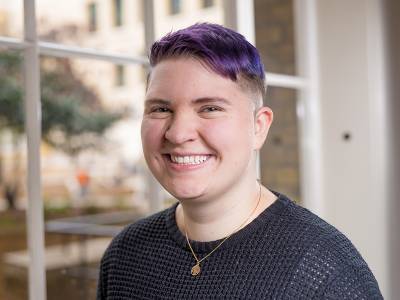
Who are you?
My name is Sebastian and I’m both transmasculine and pansexual! (Pronouns: he or they).
What’s your role at UCL?
I’m currently working as a Research Associate in Vertebrate Palaeontology in the Department of Earth Sciences, doing both research and teaching undergraduate courses. My research focus is on crocodiles – I’m currently looking at the main mechanisms of their evolution over the past 230 million years (yes, that’s as old as dinosaurs!).
Could you share something about your coming-out process (whether to yourself or others)?
I grew up in an immensely conservative area (I have wonderful parents but the surroundings…). ‘Gay’ was one of the worst slurs you could throw at someone. Trans people were abominations who weren’t even mentioned. Thanks to that I had locked in everything about myself so deeply that I only started to come out when I was 25. It wasn’t until the last year of my PhD that I came out to more than the closest of my friends. And the coming out never stops, as soon as you meet new people. It can be very tiring (but also fulfilling – a few months ago, my mother told me she’d never seen me this happy and content in my entire life. And she’s right).
Sometimes I’m still deeply, deeply angry at the people I grew up around. For more than two thirds of my life, I could have actually lived instead of just existed.
What challenges have you faced in being LGBTQ+? How did you meet these challenges?
[see work life below]
What are some good things that being LGBTQ+ has brought you?
I’ve met lots of new friends in the queer communities! I didn’t even know how much I’d needed to talk to other trans people in person until I actually did. Also, an ever-growing supply of various rainbow-coloured clothing and accessory items.
Does being LGBTQ+ affect your work life? If so, how?
The most difficult time for me is always the beginning of a new term. Unlike some others in the LGBTQIA+ community I don’t really have a choice whether I want to come out or not – or, well, the choice is between ‘outing yourself to all your students at the beginning of term even at the risk of being subject to transphobia’ or ‘staying in the closet and getting misgendered 100% of the time, making you completely miserable’. I usually choose the former, but writing the welcome email to all my new students (usually around 50) where I ask if anybody has any preferred pronouns they want me to use and, at the same time, asking them to please respect mine. So far I haven’t had any overt hate thrown at me, but the fear is there every time.
Conferences are also challenging, for similar reasons. I usually give up after half a day every day because constantly getting misgendered is so incredibly tiring.
What advice would you give someone in the UCL community thinking about coming out?
We got your back. It’s gonna be hard and you’ll doubt yourself, but no matter what happens, there ARE people cheering for you, every step of the way.
How can we make UCL even more welcoming for LGBTQ+ staff, students, and visitors?
I would love to see pronoun badges become a thing for UCL events. But, more importantly – they have to come with teaching staff and other visitors to actually respect & look at them! Wearing a pronoun badge saying ‘he/they’ is quite useless if people look at it, then look back at you and proceed to pointedly refer to you as ‘she’ (yes, it has happened).
Tell us something about yourself that we might find surprising.
In my spare time, my hobbies are as varied as you can think of. I sew costumes, do embroidery, practise HEMA (Historical European Martial Arts), am obsessed with spiders, bake, and do the occasional foray into science comedy.
- Valerie Hazan
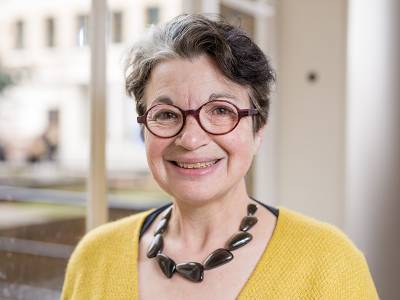
Who are you?
I guess that, apart from my identity as an academic, I identify most strongly as a lesbian parent. My partner and I have been together for nearly 25 years and have brought up two children together. I grew up in France and Belgium and moved to the UK in my late teens. I first came to UCL to do a PhD in 1980 and never left!
What’s your role at UCL?
I am a professor of Speech Sciences in the Division of Psychology and Language Sciences. I started my academic career in 1982 as a lecturer in the Department of Phonetics and Linguistics, and over the course of the last 36+ years have been a head of department not once but twice...
Could you share something about your coming-out process (whether to yourself or others)?
These memories are lost in the mists of time.
What challenges have you faced in being LGBTQ+? How did you meet these challenges?
I have been lucky enough not to face too many challenges, although coming out to my rather traditional Jewish family was not easy. One ‘challenging’ memory though is to have been initially refused entry to the maternity ward on Christmas Day, the day after our son was born, as ‘only fathers were allowed in’. Thankfully, I did barge my way in, just in time to be serenaded by the Salvation Army brass band (and a chorus of screaming babies). Things improved from then on.
What are some good things that being LGBTQ+ has brought you?
Some brilliant friends from various LGBTQ+-related singing and parenting networks over the years. It was also good to be involved, via the ’AUT and Proud’ group within the Union (AUT), in early efforts to increase LGBTQ+ visibility within the academic sector. We published the ‘Pride not Prejudice’ booklet in 1998, and, a couple of years later, a fairly major survey on ‘Lesbian, Gay and Bisexual Participation in UK Universities’. Both are still available online and give a sense of changes within our sector over the last 20 or so years.
Does being LGBTQ+ affect your work life? If so, how?
It does not affect it much currently. However, before civil partnerships, there were no pension rights for non-heterosexual partners and this was a worry for LGBTQ+ academics, especially if they had family responsibilities. In the 1990s, the ‘AUT and Proud’ group successfully lobbied for a change in work pension rules. A few months later, a colleague died suddenly and her partner received a widow’s pension which she desperately needed. That was a proud (if sad) moment.
What advice would you give someone in the UCL community thinking about coming out?
Each individual has to do what feels right to them at the time.
How can we make UCL even more welcoming for LGBTQ+ staff, students, and visitors?
Visibility is important and UCL has made great strides in recent years.
Who are your own LGBTQ+ role models (past or present)?
When I was a junior academic, my head of department was Professor John Wells (featured in the recent Queer Tapestry exhibition at UCL). John was an out gay man throughout his long career at UCL, long before this was generally seen as acceptable. He was and remains a brilliant role model.
Tell us something about yourself that we might find surprising.
In recent years, I’ve crewed on tall ships in the North and South Atlantic, South Pacific and Caribbean, and am a ‘Shellback’ having sailed across the Equator on an epic voyage from Brazil to Canada. A bit of trivia: I am a twin, married to a twin and daughter of a twin.
- Vincent Sterk
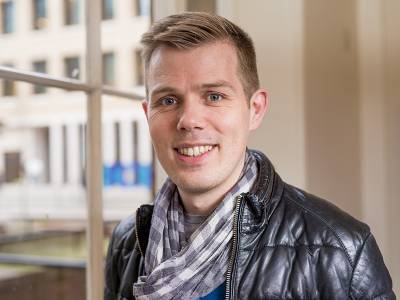
Who are you?
My name is Vincent Sterk. I’m an associate professor at UCL’s Economics departments. I am originally from the Netherlands and moved here after completing my PhD in 2011.
Could you share something about your coming-out process (whether to yourself or others)?
I came out at the end of high school, and at the beginning of university, initially to my parents and sister and then to my friends.
What challenges have you faced in being LGBTQ+? How did you meet these challenges?
Just before coming out, I felt quite uncomfortable in high school. But I feel fortunate that after coming out, I never experienced any real problems. But I’m well aware that’s not true for everyone.
What are some good things that being LGBTQ+ has brought you?
A wonderful husband! Also, it feels great to be part of a global community. Plus, LGBTQ+ parties are the best.
Does being LGBTQ+ affect your work life? If so, how?
Not on a daily basis; I do have fantastic colleagues. I wish there was more of a visible LGBTQ+ presence within the wider Economics community though.
What advice would you give someone in the UCL community thinking about coming out?
Take it at your own speed; ask someone for advice.
Who are your own LGBTQ+ role models (past or present)?
During working hours: John Maynard Keynes. After work: RuPaul, Rufus Wainwright.
 Close
Close

